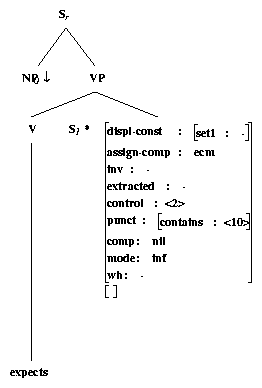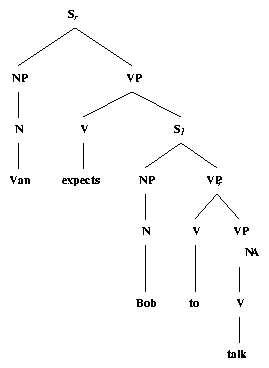


The ECM and for-to cases are analogous in how they are used together with the correct infinitival to to assign accusative case to the subject of the lower infinitive. However, they are different in that for is blocked along with other complementizers in subject extraction contexts, as discussed in section 8.6, as in ((46)), while subject extraction is compatible with ECM cases, as in ((47)).
Sentence ((46)) is ruled out by the <assign-comp>= inf nil/ind nil/ecm feature on the subject extraction tree for ask, since the <assign-comp>=for feature from the for tree will fail to unify. However, ((47)) will be allowed since <assign-comp>=ecm feature on the expect tree will unify with the foot of the ECM verb tree. The use of features allows the ECM and for-to constructions to act the same for exceptional case assignment, while also being distinguished for that-trace violations. Verbs that take bare infinitives, as in ((48)), are also treated as ECM verbs, the only difference being that their foot feature has <mode>=base instead of <mode>=inf. Since the complement does not have to, there is no question of using the to tree for allowing accusative case to be assigned. Instead, verbs with <mode>=base allow either accusative or nominative case to be assigned to the subject. The foot of the ECM bare infinitive tree forces the subject to be accusative by its <assign-case>=acc value at its foot node which unifies with the <assign-case>=nom/acc value of the bare infinitive clause.
The passive for the ECM verbs is treated as a raising verb. Since the subject of the infinitive is not thematically selected by the ECM verb, it is not part of the ECM verb's tree, and so it cannot be part of the passive tree. Therefore, the passive acts as a raising verb, and so for example, the sentence John is believed to be happy would be derived by adjoining believed in as a raising verb. For further discussion, see section 9.3.1.